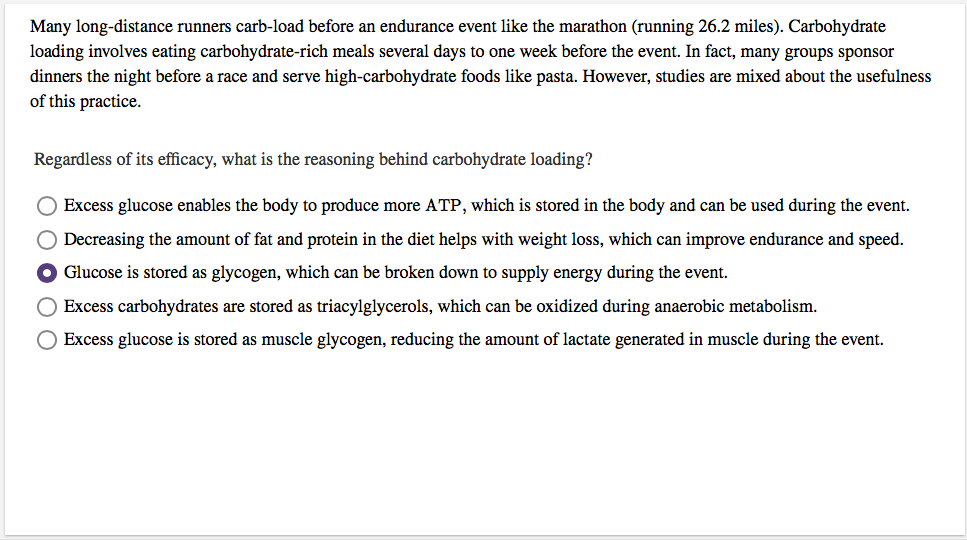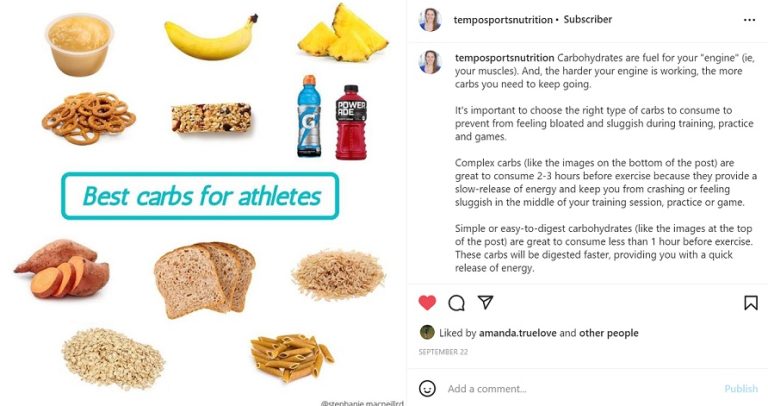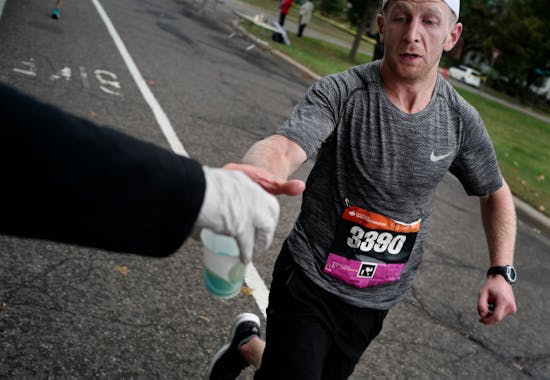Why Do Marathon Runners Carb Load
Marathon runners carb load to provide the necessary energy for their long-distance race, as carbohydrates are the body’s primary fuel source during exercise. Proper carbohydrate intake before a marathon helps to maximize glycogen stores, ensuring sustained energy levels throughout the race.
The Science Of Carb Loading
Carb loading involves increasing carbohydrate intake before a marathon to fuel the muscles efficiently.
This process maximizes glycogen stores, enhancing endurance and performance on race day.
- Oxygen efficiency: Carbs provide quick energy for muscles.
- Stamina boost: Increased glycogen stores lead to prolonged energy.
- Prevents hitting the wall: Carb loading helps runners avoid fatigue mid-race.

Credit: www.themotherrunners.com
Carb Loading Strategies
Marathon runners carb load to maximize glycogen stores and boost endurance. This strategy helps delay the onset of fatigue and provides a readily available fuel source during the race, ultimately improving performance. By consuming high-carbohydrate foods in the days leading up to the marathon, runners aim to optimize their energy levels for the long-distance event.
Carbohydrate loading, also known as carb loading, is a strategy commonly employed by marathon runners to maximize their glycogen stores before a big race. By increasing their intake of carbohydrates in the days leading up to the event, runners are able to provide their muscles with the energy they need to go the distance.Types Of Carbohydrates To Consume
When it comes to carb loading, not all carbohydrates are created equal. Runners should focus on consuming complex carbohydrates that are high in fiber, such as whole grains, starchy vegetables, and legumes. These slow-digesting carbohydrates provide a sustained release of energy, which can be especially beneficial during long endurance events like marathons.Timing Of Carb Loading
Timing is everything when it comes to carb loading. The goal is to maximize glycogen stores without feeling overly full or experiencing digestive discomfort on race day. Most runners begin carb loading two to three days before the marathon, gradually increasing their carbohydrate intake each day. This allows enough time for glycogen stores to reach their peak without excess bloating or sluggishness.Sample Carb Loading Schedule
To give you an idea of what a carb loading schedule might look like, here’s a sample plan:- Two days before the race: Increase carbohydrate intake to about 70% of total calories.
- One day before the race: Continue with the high-carbohydrate diet, focusing on easily digestible foods like rice, pasta, and fruits.
- Race day: Consume a small, carbohydrate-rich meal a few hours before the race to top off glycogen stores.
Pre-marathon Nutrition
As marathon runners, we know that preparation is key to a successful race. And one crucial component of this preparation is pre-marathon nutrition, which includes deliberate carb loading and maintaining proper hydration. Let’s delve into why marathon runners focus on these aspects and how they can impact performance on race day.
Balanced Diet Before The Marathon
A balanced and wholesome diet plays a vital role in sustaining energy levels during a marathon. It is important to consume a variety of carbohydrates, proteins, and healthy fats in the right proportions. Carbohydrates, especially complex ones like whole grains, fruits, and vegetables, are the primary fuel source for muscles during prolonged exercise.
Avoiding excessively fatty or spicy foods a day or two before the race is advisable, as they can cause digestive issues and hinder performance. Similarly, it’s best to steer clear of high-fiber foods that may increase the likelihood of gastrointestinal discomfort during the race.
Included below is a table outlining some of the foods that provide essential nutrients for marathon runners:
| Carbohydrates | Proteins | Healthy Fats |
|---|---|---|
| Whole grains (oats, brown rice) | Lean meats (chicken, fish) | Nuts and seeds |
| Fruits (banana, apples) | Legumes (beans, lentils) | Olive oil, avocados |
| Vegetables (sweet potatoes, broccoli) | Dairy products (milk, yogurt) | Fatty fish (salmon, tuna) |
Hydration Importance
Proper hydration is paramount for marathon runners to maintain their performance and avoid potential health risks. Water and electrolytes are lost through sweat during prolonged exercise, emphasizing the need to replenish these fluids before, during, and after the race.
Dehydration can have detrimental effects on physical and mental performance. It can lead to muscle cramps, dizziness, confusion, and fatigue, hindering one’s ability to endure the entire race. Therefore, it is crucial to hydrate adequately leading up to the marathon and continue drinking water during the race.
Here are some key points to remember regarding hydration:
- Drink water gradually throughout the day, aiming for at least eight glasses (64 ounces) daily.
- Consume water with meals leading up to the race and avoid excessive caffeine or sugary drinks, as they can have a diuretic effect.
- Be mindful of your urine color; a pale yellow color indicates proper hydration, while dark yellow or amber may signal dehydration.
By adhering to a balanced diet and staying properly hydrated, marathon runners can optimize their performance on race day. Hence, putting effort into pre-marathon nutrition is essential for achieving personal goals and conquering those 26.2 miles.

Credit: www.chegg.com
Impact On Performance
Why do marathon runners carb load? One of the primary reasons is its impact on performance. By properly fueling the body with carbohydrates before a race, runners can optimize their energy levels and endurance.
Role Of Glycogen Stores
Glycogen stores play a crucial role in endurance activities. These reserves are built up through carb loading, ensuring that runners have a sustainable energy source to tap into during a marathon.
Fueling Endurance
Carb loading directly impacts the athlete’s ability to sustain prolonged physical activity. By maximizing glycogen stores, runners can maintain a steady pace and delay the onset of fatigue, ultimately improving their overall performance.
Potential Pitfalls
It’s essential for marathon runners to carb load before a race for optimal energy levels, but there are potential pitfalls to be aware of. Understanding these pitfalls will help runners navigate their pre-race nutrition effectively.
Overeating Carbohydrates
Excessive consumption of carbohydrates can lead to unwanted weight gain, bloating, and decreased performance. It’s crucial for runners to balance their carbohydrate intake with their individual energy needs to avoid overloading their system.
Digestive Issues
Consuming large quantities of carbohydrates in a short period can cause digestive discomfort, such as bloating, gas, and diarrhea. Runners should opt for easily digestible carbohydrate sources like rice, pasta, and bread to prevent gastric distress during the race.

Credit: www.all-about-marathon-training.com
Frequently Asked Questions Of Why Do Marathon Runners Carb Load
Can You Run A Marathon Without Carb Loading?
Yes, you can run a marathon without carb loading, but it may affect your performance.
Why Is Carb Loading Important For Marathon Runners?
Carb loading is crucial for marathon runners as it provides the necessary energy for long-distance running. It replenishes glycogen stores in the muscles, enhancing endurance and preventing fatigue. By consuming high-carbohydrate meals before the race, runners improve their performance and delay hitting the wall.
Why Do Marathon Runners Eat A Lot Of Carbohydrates?
Marathon runners eat a lot of carbohydrates because they provide the body with a quick source of energy during long-distance running. Carbs are easily broken down into glucose, which fuels the muscles and helps prevent fatigue.
Conclusion
In preparation for a marathon, carb loading is crucial for energy sustenance. Proper nutrition improves performance and endurance. Understanding the significance of carb loading can enhance your running experience. Remember, fuel your body right to conquer the miles ahead. Run smart, eat well, and crush those marathons!



